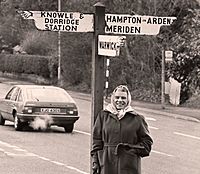Margaret Gelling facts for kids
Quick facts for kids
Margaret Joy Gelling
|
|
|---|---|
 |
|
| Born |
Margaret Joy Midgley
29 November 1924 Manchester, England
|
| Died | 24 April 2009 (aged 84) |
| Education | Chislehurst Grammar School |
| Alma mater | St Hilda's College, Oxford (BA), University College London (PhD) |
| Occupation | toponymist |
| Spouse(s) | Peter Stanley Gelling |
Margaret Joy Gelling (born Margaret Joy Midgley; November 29, 1924 – April 24, 2009) was a famous English expert in place-names. She spent her life studying the names of places in England. She was the President of the English Place-Name Society from 1986 to 1998. She also served as Vice-President of the International Council of Onomastic Sciences from 1993 to 1999. Margaret Gelling was also a Fellow at St Hilda's College, Oxford, and was recognized by important groups like the Society of Antiquaries of London and the British Academy.
Born in Manchester, Margaret grew up in Kent. She went to St Hilda's College, Oxford, where she became interested in political ideas about fairness for everyone. After college, she worked for the English Place-Name Society, studying names in Oxfordshire and Berkshire. In 1952, she married archaeologist Peter Gelling and moved to Harborne. She continued her studies, earning a PhD by researching place-names in West Berkshire. She shared her knowledge by giving talks and writing books. Her 1978 book, Signposts to the Past, became very well-known. Later, she focused on place-names in Shropshire and received many awards for her important work.
Margaret Gelling's studies helped us understand how English place-names came from Old English words. She also showed how these names often describe natural features in the landscape, like rivers or hills.
Margaret Gelling's Life
Early Years and Education: 1924–1951
Margaret Joy Midgley was born in Manchester on November 29, 1924. Her father was an insurance salesman. When she was a child, her family moved to Sidcup in Kent. She went to Chislehurst Grammar School. Margaret was the first person in her family to go to university. She studied English language and literature at St Hilda's College, Oxford. There, a teacher named Dorothy Whitelock inspired her interest in place-names.
Margaret finished university in 1945. She later said that studying English literature was "dreadfully boring." She was interested in politics and believed in socialism, which is a political idea about making society fairer for everyone. At Oxford, she joined the Communist Party of Great Britain, a political group that believed in a society where everyone is equal and resources are shared. She enjoyed discussing politics with her family, even though they had different views.
After college, Margaret worked for the government in London for a year. In 1946, she started working as a research assistant for the English Place-Name Society in Cambridge. This society studies the history and meaning of place-names. She worked there for eight years, collecting and expanding information on place-names in Oxfordshire and Berkshire. Other scholars had started this project, and Margaret's work was later published in two books called The Place-Names of Oxfordshire (1953–54). She felt her approach was different from earlier scholars because she believed most place-names were created by ordinary working people, not just by powerful rulers.
Later Life and Achievements: 1952–2009
In 1952, Margaret married Peter Gelling, an archaeologist. He soon got a job teaching at the University of Birmingham. So, they moved to Harborne, where Margaret lived for the rest of her life. She loved gardening there. Although she didn't have her own children, she helped raise her nephew, Adrian Midgley, from when he was six years old.
Margaret continued her studies and earned a PhD from the University of London in 1957. Her PhD research focused on the place-names of West Berkshire. She had left the Communist Party but still considered herself "very left-wing," meaning she still believed strongly in ideas about social equality. She even campaigned for the local Labour Party, a center-left political party in the UK.
Margaret often joined her husband on his archaeological digs, both in the UK and in other countries. In the 1960s, they went to Peru to study how potatoes were grown. In the early 1970s, she traveled with him to Cyprus. She was helping sort old items in a castle in Kyrenia when the Turkish army invaded in July 1974. For several years, she also helped with cooking and keeping spirits up at her husband's student training dig in Deerness, Orkney.
During the 1960s, Margaret published several new books about English place-names. She also gave many talks on the subject across the English Midlands through the University of Birmingham. She sometimes lectured at Birmingham University and ran a summer school at Oxford. She then published three books on The Place-Names of Berkshire (1973, 1974, and 1976). After that, she wrote Signposts to the Past: Place-Names and the History of England (1978). This book made her one of the most respected experts in English place-names. It was so popular that new versions were published in 1987 and 1997.
Peter Gelling passed away in 1983. Margaret continued her important work. She became the President of the English Place-Name Society from 1986 to 1998. Then, she was the Vice-President of the International Council for Onomastic Sciences from 1993 to 1999. In 1993, she became a Fellow of St Hilda's College. She received an Order of the British Empire (OBE) in 1995, which is a special award from the British government. In 1998, she was elected a Fellow of the British Academy. This was a rare honor for someone who had never held a full-time university teaching job. Margaret Gelling continued giving talks until she became ill and passed away on April 24, 2009.
 | Emma Amos |
 | Edward Mitchell Bannister |
 | Larry D. Alexander |
 | Ernie Barnes |

